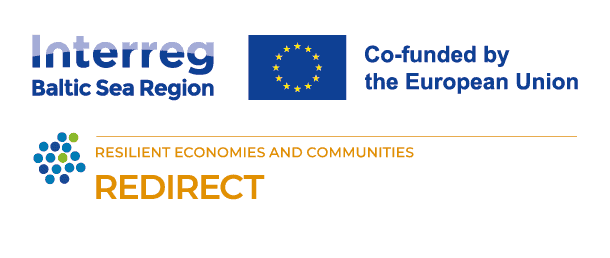Advisory and Expertise Committee meeting March 26th 2026
Project: REDIRECT
Virtual Meeting
26. March 2026
00:00 - 23:59 (BST)

Background
The Baltic Sea Region is a particularly sensitive environment, susceptible to the effects of increased tourism. The negative environmental impacts of tourism are substantial. They include the depletion of local natural resources, as well as pollution and external disturbances to the local environment. Tourism puts pressure on locally available resources through over-consumption, local waste handling as well as pollution, wear and degeneration of nature habitats through periodically condensed activity.
We need a change in the impact of tourism. We need tourists to add measurable positive value instead of the opposite.
Regenerative tourism is introducing a sustainable approach to travel that aims to restore and replenish the environment that tourists visit. This type of tourism goes beyond minimizing negative impacts and strives to create positive outcomes for the destinations and people involved.
The major actors in tackling this challenge are both the public sector – local authorities and the private sector – SMEs. The cooperation of both is essential for conscious tourism sector development – a regenerative mindset approach.
The regenerative tourism approach is not well known. There is a lack of awareness, as well as capability and capacity to disseminate and adopt a regenerative mindset.
The challenge lies in effectively defining and promoting regenerative tourism.
Simple guidelines and a uniform toolbox are needed to make this approach easy to integrate locally to decrease tourism impact. Guiding persistent dissemination and activities at the destinations is required to encourage the adoption of a regenerative mindset and integrate practices into the tourism sector planning processes. Which the REDIRECT project will build its solutions upon.
The Project aim
The REDIRECT approach aims to have a positive impact on the development and resilience of local communities, contributing to a higher level of environmental self-sufficiency in the tourism sector. Furthermore, aiming for the establishment of a higher level of public awareness and hereby strengthening culture and heritage within the Baltic Sea Region.
The key aim is to create a thoroughly tested generic guide on how to establish and promote environmental regenerative tourism practices in the Baltic Sea Region.
The purpose of the transnational collaboration is to inspire and strengthen the shared European development of sustainable tourism, through the development of regenerative tourism projects in the entire Baltic Region.
The project approach
The goal is to define, develop and launch regenerative tourism initiatives locally, and evaluate and test the effects, to gather relevant and valuable experience and data. The experience and results will be converted into a final toolkit and best practice guide which will be disseminated for further implementation.
Initial phase (WP 1) – developing and building
The project partners will develop a Regenerative Tourism Planning Toolkit aiming to establish a uniform tourism sector design using circular practices and metrics, utilized to implement regenerative tourism activities and tours. Such a toolkit will consist of:
Mid phase (WP 2) – testing and shaping
Final phase (WP 3) – disseminating
The Project output – the Regenerative Tourism Manual
The final output should assist in promoting the concept of regenerative tourism, aid in the planning and execution of regenerative tourism practices, encourage circular practices, support businesses and communities in implementing environmental circular approaches to regenerative tourism, and encourage the adoption of integrated and systematic approaches to mitigate the human impact on the environment within the tourism sector.
Project funding
The project is 80% funded by the Interreg Baltic Sea program and runs for three years, with kick-off in Marts 2025, and completion in February 2028.
The project has a total budget of EUR 2,764,256.
The Partners Behind the Project
The REDIRECT partnership includes solution-providers as well as implementers and promoters, who cooperate with each other throughout the project, from the solution preparation, through piloting and finalizing the results, to the outcome promotion and anchoring a durability plan.
The project partners are:
For the Consortium Project to be balanced and well-developed, several associated partners are involved, including tourism information centers, tourism associations, regenerative tourism pioneers, and local authorities, who are involved in and managing the development of tourism within their territory.
Project: REDIRECT
Virtual Meeting
26. February 2026
00:00 - 23:59 (BST)
Project: REDIRECT
Virtual Meeting
29. January 2026
00:00 - 23:59 (BST)
Project: REDIRECT
Physical Meeting
28. - 31. October 2025
Project: REDIRECT
Virtual Meeting
08. August 2025
12:00 - 13:00 (CET)
Project: REDIRECT
Physical Meeting
07. - 08. May 2025